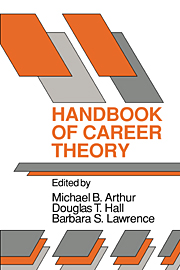Book contents
- Frontmatter
- Contents
- List of contributors
- Preface
- PART I CURRENT APPROACHES TO THE STUDY OF CAREERS
- Introduction to Part I
- 1 Generating new directions in career theory: the case for a transdisciplinary approach
- 2 Trait-factor theories: traditional cornerstone of career theory
- 3 Careers, identities, and institutions: the legacy of the Chicago School of Sociology
- 4 The utility of adult development theory in understanding career adjustment process
- 5 Developmental views of careers in organizations
- 6 Exploring women's development: implications for career theory, practice, and research
- 7 The influence of race on career dynamics: theory and research on minority career experiences
- 8 Asynchronism in dual-career and family linkages
- 9 Transitions, work histories, and careers
- 10 Career system profiles and strategic staffing
- PART II NEW IDEAS FOR THE STUDY OF CAREERS
- PART III FUTURE DIRECTIONS FOR THE DEVELOPMENT OF CAREER THEORY
- Name index
- Subject index
1 - Generating new directions in career theory: the case for a transdisciplinary approach
Published online by Cambridge University Press: 05 June 2012
- Frontmatter
- Contents
- List of contributors
- Preface
- PART I CURRENT APPROACHES TO THE STUDY OF CAREERS
- Introduction to Part I
- 1 Generating new directions in career theory: the case for a transdisciplinary approach
- 2 Trait-factor theories: traditional cornerstone of career theory
- 3 Careers, identities, and institutions: the legacy of the Chicago School of Sociology
- 4 The utility of adult development theory in understanding career adjustment process
- 5 Developmental views of careers in organizations
- 6 Exploring women's development: implications for career theory, practice, and research
- 7 The influence of race on career dynamics: theory and research on minority career experiences
- 8 Asynchronism in dual-career and family linkages
- 9 Transitions, work histories, and careers
- 10 Career system profiles and strategic staffing
- PART II NEW IDEAS FOR THE STUDY OF CAREERS
- PART III FUTURE DIRECTIONS FOR THE DEVELOPMENT OF CAREER THEORY
- Name index
- Subject index
Summary
The limitation of social organization is found in the inability of individuals to place themselves in the perspectives of others, to take their points of view.
George Herbert Mead, 1927When we pause in our studies to reflect on theory and method, the greatest yield is a restatement of our problems.
C. Wright Mills, 1959The concept of the career has never been more popular. Once viewed mainly as a synonym for initial job choice, it is now widely accepted as a central feature in employment arrangements. Career development and human resource management programs are not only widely accepted but also seen as critical to both individuals and organizations. Such programs cover a wide range of issues, from individual careers and work–family accommodation, to policy and strategic concerns such as the aging of the work force, adaptation to new technology, and organizational productivity (Gutteridge, 1986; Mills, 1985). However, these trends mean that much of the practice of managing careers has come close to catching up with the body of theory that inspired it (Hall and Associates, 1986). Either career theory has served its purpose and should be laid to rest or it needs a good shot in the arm.
We believe this state of affairs exists not because we are done explaining careers, but because work on the topic has moved away from its conceptually rich heritage. As a result, career studies are at risk of addressing increasingly narrow and decreasingly innovative questions. Our view is that a good shot in the arm will help rejuvenate career theory and also help us adapt to the dynamic character of modern industrial society.
- Type
- Chapter
- Information
- Handbook of Career Theory , pp. 7 - 25Publisher: Cambridge University PressPrint publication year: 1989
- 182
- Cited by



